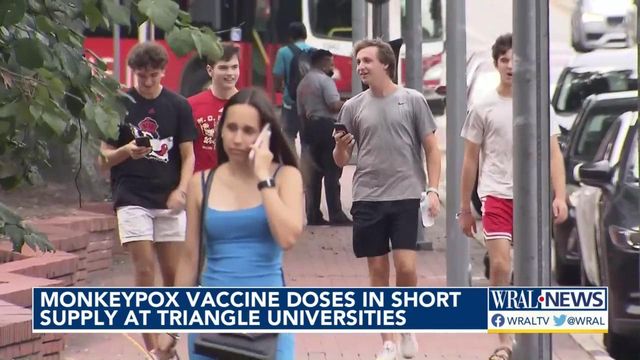Tens of thousands of students, very few doses of monkeypox vaccine as college year begins
As the fall semester gets underway, Duke, University of North Carolina at Chapel Hill and North Carolina State University are offering monkeypox vaccines to students, but they are in very short supply.
Posted — UpdatedFriday's update showed 288 cases of the virus in North Carolina, which is more than double the 138 cases on Aug. 12. Currently, the state is averaging 10 new cases a day over the last week.
For a total student body just over 34,000, N.C. State only has about 60 doses of the vaccine, and half of those doses have already been used.
Data from the state Department of Health and Human Services shows the majority of monkeypox cases are in men who have sex with men between the ages of 30 and 49. But, 38% of infections are among people 18 to 29, which is why there is some concern about transmission on college campuses.
"We are just cautiously aware," said Dr. Julie Casani, the medical director for N.C. State.
On the rebound from the coronavirus pandemic, university leaders must now navigate another outbreak.
“We are prepared, but I am not scared and running around nervous," said Casani.
Health services at all three major Triangle universities are testing and vaccinating for the virus. However, Dr. David Weber, an infectious disease specialist at UNC Health, said there have not been talks about doing a large-scale vaccination event on campus.
"The answer is no, and that's simply because we don't have enough vaccine to do it," he said.
So far, North Carolina have received more than 18,000 doses of the vaccine. But only 50%, or 9,300 doses, of the vaccine have been given out.
Health experts said very little vaccine has trickled down to college campuses.
"I don’t think it’s going to be a major issue for college students. I worry about some college groups. I’ve had some questions about wrestlers, for instance, lots of skin-to-skin contact," said Weber.
Monkeypox is spreading primarily through intimate contact among gay and bisexual men. However, two women and two children in North Carolina have tested positive.
Starting Monday, to stretch the supply of vaccine, providers will give a smaller dose through a top layer of skin in the forearm. The vaccine can leave a bump or bruise for weeks and potentially months.
Weber said he anticipates some people might use the marking as a reason not to get vaccinated, but says research is being done on whether the injection can be given in a different location.
"I worry some people in high-risk groups, if other people see a spot and it gets well publicized, it will sort of out them or at least people will assume what type of behavior they have even if it is not particularly true," said Weber.
“I think, especially in a population that feels marginalized to begin with and feels stigmatized to begin with, there is concern about that," said Casani.
Casani said N.C. State anticipates requesting more vaccine doses soon.
"I think it's a great way of prevention. It's not a hard thing to teach the students at N.C. State this, but it's a great way to teach that vaccines are important, they are preventative, and they are a good way of heathy living," she said.
She's less worried about the supply and more about the messaging.
"How do we make sure people get the right care at the right time and the right place while reducing any kind of stigma that might come about it," said Casani.
Currently, the monkeypox vaccine is only available to those at high risk, including people who are in close contact with others who’ve tested positive for monkeypox, gay and bisexual men and transgender people. There are still reports of people waiting weeks to get a vaccine.
• Credits
Copyright 2024 by Capitol Broadcasting Company. All rights reserved. This material may not be published, broadcast, rewritten or redistributed.






